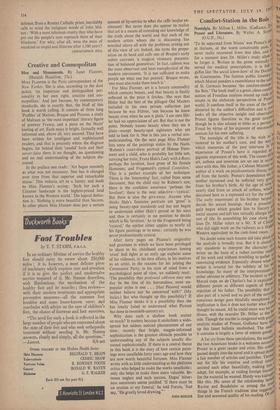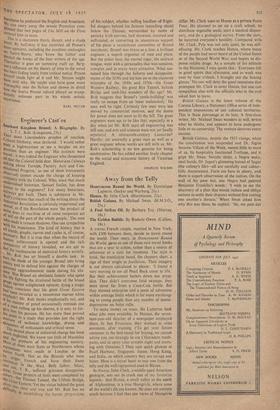Comfort-Station in the Bois
`To be separated from Mama' was Proust's ids{ at thirteen, of the worst conceivable pain. 1/,i never really recovered from that idea, and II. for a moment does Dr. Miller's study allow to forget it. Written in the prose normally lei served for medical prescriptions, it is full gaffes like 'the social know-how' of the DuchlelF de Guermantes. The famous public lavatory which Marcel ponders a resemblance to the sal of St. Germain becomes 'the comfort-station the Bois.' The book itself is a great, clean conl station of Freudian analysis reared up rude , simple in the elaborate perspectives of ProuP world. It confines itself to the areas of the 11°, • distorted by the author's difficulties and it or looks all the objective insight and observan°, Proust figures therefore as the great neurotl though he is also saluted at times as a partner Freud by virtue of his exposure of unconscloo sources for his own suffering. The nostalgia' of the title is the wish to y restored to his mother's care, and the waY,vi which memories of the past intervene in ' experience of Proust's hero is regarded as • gigantic expression of this wish. The causes of r art, asthma and inversion are set out in actor ante with this. His father, a Cabinet Minister 003 author of a work on psychosomatic illness, st°,p , off from the family. Proust's dependence on P mother increased and he suffered very greelp from his brother's birth. At the age of nine it , nearly died from an attack of asthma, which , discussed here as a repressed cry for the moths!„ The early resentment at his brother helped '• decide his sexual leanings. And a pressure guilt began which goaded him to literary social success and left him virtually allergic to lz rest of life. In assembling his case along Oleo lines Dr. Miller refers to a Mr. X of Chiral who did night work on the railways as a Mid° Western equivalent to the cork-lined room. oj No doubt some such trauma did take place 3,,, the analysis is broadly true. But it is absurd l; any standards to interpret the character of.a: writer on the basis of a rather cavalier readl,r of his work and without troubling to gather a,' ti convincing evidence. Especially absurd when )1. ri writer is revered for the subtlety of his sep knowledge. So many of the interpretations . ti either obvious or arbitrary. The incident in gibl Marcel steps on de Charlus's hat is explained different points as different aspects of Prot's, i rejection of his father. The possibility that !It also part of a novel and so part of the novel° conscious design goes blissfully unexplored. Lis it implication is that it does not matter what Prof thought he meant. All he could mean was his ° illness, with the oracular Dr. Miller at the uh'c, h side. Though the market is congested with psYcirrof analytic studies of Proust, Gollancz have 0;4 e up this latest bulletin unabashed. The anal it contains is largely a form of solemn gossill A far cry from these speculations, the second, the two American books is a welcome account Proust as a great reader and critic. His critic passed deeply into the novel and is spread thr a fair number of articles and pastiches. Throe ,40- out his life his creative and critical inler''.0 assisted each other beautifully, making hill 1.0; adept, for example, at raiding foreign literatill for the material he wanted. Hardy was kidnatel like this. His sense of the relationship bet""'i Racine and Baudelaire as among the crust things in the French tradition also suggestslit fine and seasoned quality of his reading. Of 0` literatures he preferred the English and American. We can carry away the ornate Proustian corn- Pliment that two pages of The Mill on the Floss reduced him to tears. This is a doctorate thesis, decent, and a shade taTUd. By half-way it has recorded all Proust's main opinions, including the excellent onslaughts " Sain+e-Beuve, who 'knew the father' and decried the books of the best writers of the age. Thereafter it goes on summing itself up. Berg- son S influence on the theory of time in the novel has kbeen fading lately from critical notice. Proust ',1,141self made light of it and Mr. Strauss might Have said why. He might also have gone more thoroughly into the fiction and shown in detail how the books Proust valued played an excep- tionally intimate part in his whole artistic experience.
KARL!HILLER















































 Previous page
Previous page